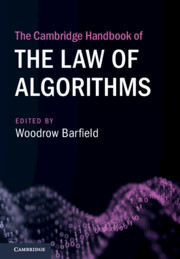Book contents
- The Cambridge Handbook of the Law of Algorithms
- The Cambridge Handbook of the Law of Algorithms
- Copyright page
- Contents
- Figures
- Tables
- Notes on Contributors
- Foreword
- Preface
- Acknowledgements
- Abbreviations
- Part I Introduction and Setting the Stage for a Law of Algorithms
- Part II Business, Regulations, and Decision-Making with Algorithms
- Part III Intellectual Property and Algorithms
- Part IV Criminal Law, Tort Issues, and Algorithms
- 19 The Use of Algorithms in Criminal Adjudication
- 20 Assessing the Risk of Offending through Algorithms
- 21 Injury by Algorithms
- 22 When Do Algorithmic Tortfeasors that Caused Damage Warrant Unique Legal Treatment?
- 23 Tort Law
- Part V Constitutional Law, Human Rights, and Algorithms
- Part VI Applications and Future Directions of Law and Algorithms
- Index
19 - The Use of Algorithms in Criminal Adjudication
from Part IV - Criminal Law, Tort Issues, and Algorithms
Published online by Cambridge University Press: 19 October 2020
- The Cambridge Handbook of the Law of Algorithms
- The Cambridge Handbook of the Law of Algorithms
- Copyright page
- Contents
- Figures
- Tables
- Notes on Contributors
- Foreword
- Preface
- Acknowledgements
- Abbreviations
- Part I Introduction and Setting the Stage for a Law of Algorithms
- Part II Business, Regulations, and Decision-Making with Algorithms
- Part III Intellectual Property and Algorithms
- Part IV Criminal Law, Tort Issues, and Algorithms
- 19 The Use of Algorithms in Criminal Adjudication
- 20 Assessing the Risk of Offending through Algorithms
- 21 Injury by Algorithms
- 22 When Do Algorithmic Tortfeasors that Caused Damage Warrant Unique Legal Treatment?
- 23 Tort Law
- Part V Constitutional Law, Human Rights, and Algorithms
- Part VI Applications and Future Directions of Law and Algorithms
- Index
Summary
The use of “algorithms” in criminal investigation, adjudication, and punishment is not a new phenomenon. That is, to the extent that “algorithms” are simply sets of rules capable of being executed by a machine, the criminal justice system has long incorporated their use. For example, the US sentencing guidelines are so mechanistic that they were, at least for a time, literally calculated by software. Likewise, the New York Police Department’s erstwhile “stop and frisk” program was a mechanistic means of deciding whom to search and when. And so-called “per se” impaired driving laws have for nearly half a century mechanistically imposed criminal liability based on a machine’s determination that a person’s blood-alcohol level is over a certain threshold, without a jury determination of dangerous impairment.
- Type
- Chapter
- Information
- The Cambridge Handbook of the Law of Algorithms , pp. 407 - 431Publisher: Cambridge University PressPrint publication year: 2020

